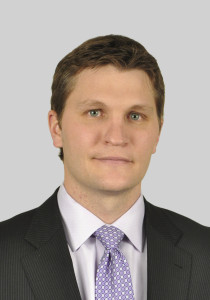
ALUMNI SPOTLIGHT
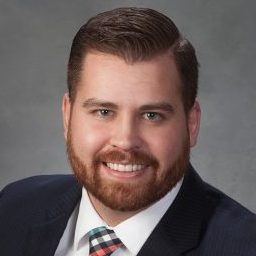 Former Delaware Journal of Corporate Law Styles Editor, Greg Flasser, gives us some insight into his experience during law school and his career today.
Former Delaware Journal of Corporate Law Styles Editor, Greg Flasser, gives us some insight into his experience during law school and his career today.
(1) What was your position on the Journal?
Styles Editor
(3) Where are you currently employed?
Bayard, P.A., Wilmington, Delaware
(3) In what area of law do you practice?
Bankruptcy
(4) What career track did you follow?
I didn’t have a job lined up out of law school. I studied for the bar while trying to network as much as possible. After the bar exam I finally landed a job in NJ at a small personal injury firm. Realizing that I wanted to work in DE, and specifically in corporate law, I continued to research jobs and after about 3 months I landed a job in Wilmington at an insurance defense firm. 6 months after that I bumped into one of the partners from Bayard who I had previously had lunch with. A few weeks later they brought me in for an interview.
(5) What do you wish you had known about law school while you were a law student?
Fortunately, it didn’t impact me all that much, but one thing I saw from others is that your academic success during your first semester can shape the rest of your law school experience. If you have a slow start academically, you will spend the next 2 and a half years digging yourself out of a hole.
(6) Aside from excelling academically and joining the Journal, what are some ways that students can stand out to secure job offers?
Get to know your professors. They can be great resources when it comes time to find a job. Once you know what field you are interested in, ask those professors if they can put you in touch with attorneys in that area. Connect with them and ask them to meet you for coffee or lunch. Don’t be afraid to express an interest in their firm and ask if they have a need for associates or interns. If they do not, ask those attorneys to put you contact with others that might have a need. It’s all about networking!!
Additionally, get involved in the legal community where you want to practice. Attend lectures, events, Inn of Court meetings, etc. Introduce yourself to as many people as you can.
(7) What are some lessons you’ve learned during your professional career that will be valuable to current Journal members and recent graduates?
Learn to adapt to your surroundings. Even if you stay with one firm for your entire career, the inner workings of that firm will likely change. The firm might grow or downsize, attorneys may come and go, and you will be working with and for a variety of personalities. You start to pick up on different preferences that each of the partners have. Lastly, speak up. Talk to the partners. If you need more work, let them know. If you have too much on your plate, let them know. The worst thing you can do is stay silent and blow a deadline.
(8) What are your future career goals?
I’d like to stay with Bayard for as long as they’ll have me. My goal is to grow my practice, my substantive knowledge, and book of business so that one day I might make partner. Maybe later in life I’ll shift to something else. I’m not sure what that is yet.
(9) What are some of your other interests?
I enjoy traveling, skiing, fishing, hiking, golfing, and food. One of the things I look forward to each year is a ski trip out west with a group of friends. I also love spending time with my wife and dog regardless of what we’re doing
______________________________________________________________
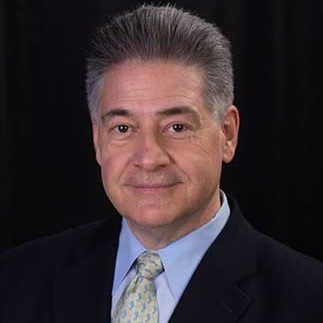
Former Delaware Journal of Corporate Law Staff Member, Richard A. DiLiberto, Jr., Esq. gives candid insight into what he learned as a law student and a practitioner that shaped him into the attorney he is today.
(1) What was your position on the Journal?
Staff Member
(2) Where did you earn your undergraduate degree and what was your area of study?
B.S. in Education (cum laude) with area of concentration in Psychology, 1982, Bloomsburg University of Pennsylvania
(3) Where are you currently employed?
Partner, Young Conaway Stargatt & Taylor, LLP, Wilmington, Delaware
(4) In what area of law do you practice?
Plaintiff’s Personal Injury
(5) What do you wish you had known about law school while you were a law student?
Law school is primarily intended to help the student to develop an analytical thought process, and problem solving skills. Learn to think like a lawyer. It is not intended to educate the student on all aspects of law. The law is immense and overwhelming, constantly changing, and the lawyer will be re-educated every day of his/her career. That’s why they call it a “practice.” Do not expect to be an expert on every area of law. Choose one or two areas which you enjoy, and at which you seem to excel, upon which to focus and specialize. The law is simply the set of rules we must follow to live in a civilized society. At its truest level, the law is not intended to be complex and mysterious. It is intended to be practical, simple and equitable. It is the lawyer’s job to interpret and explain the law to her/his client to assist in everyday problem solving.
(6) Aside from excelling academically and joining the Journal, what are some ways that students can stand out to secure job offers?
Take courses and participate in activities which stress good, quality writing, and public speaking. Show initiative and ambition by stepping outside your comfort zone. Be visible in the community and Bar-related organizations. When I was a student, Dean Anthony Santoro asked me to participate as the law school’s student advocate in the Delaware branch of the American Inns of Court, and prepare a mock trial with local lawyers and judges at the New Castle County courthouse. I initially resisted, because I was already overwhelmed with my legal studies, law review, an internship, and family responsibilities. Dean Santoro said, “Rick, you should do it. You never know who’s watching.” I did the hard work to prepare, and presented a mock trial with some very experienced members of the Delaware Bar, with many lawyers and judges in the audience. A year later, I graduated Delaware Law School and started a judicial clerkship in Delaware Superior Court. During my judicial clerkship, I started applying for attorney positions with Delaware firms. I went through two rounds of interviews with Young Conaway, and the partners wanted me to come back for a third interview, with Mr. Bruce Stargatt, a name partner, founder of the firm, and a giant in the Bar. Needless to say, I was a bit nervous as I entered his dark mahogany wood paneled office and was directed to sit in a low chair in front of his tall and seemingly massive desk as he inquisitively peered over his half-moon reading glasses at 25-year-old me. I could barely make out his face through the dim green glass desk lamp’s low-wattage illumination, and a thick shroud of cigar smoke (Lawyers were allowed to smoke in the office in those days). “What in the world will he ask me?” I wondered. Bruce continued to stare at me, silently and tilted his head slightly. Then a slight avuncular smile came over his face. His first words came clearly though the smoke. “Didn’t you do a mock trial at the courthouse for the Inns of Court a few years ago?” he asked. “Yes, I did, sir!” I responded confidently. “I was in the audience,” Bruce continued. “You did a fine job. I think you are going to be a good lawyer.” Well, I got the job offer, eventually became Bruce’s friend, trusted colleague and law partner, and have been at the firm 31 years. Had I not done the hard work to go “above and beyond” and prepare the mock trial, it would never have happened. And, Dean Santoro’s words still ring true, “You never know who’s watching!”
(7) What are some lessons you’ve learned during your professional career that will be valuable to current Journal members and recent graduates?
Master the Rules of Civil or Criminal Procedure, Evidence and Professional Responsibility, and you will be ahead of 90% of your colleagues. Treat your clients and colleagues as you would want to be treated. You gradually gain a reputation with the court with years of credibility and candor, but can lose it in a moment by doing something stupid. There is no such answer as “I don’t know” to a question from a partner, client or judge. The better answer is, “I will research it and provide you with the law.” When you are winning an oral argument, sit down. Waive rebuttal if the court suggests it. It means you are winning, and you don’t want to inadvertently change the judge’s mind. Do not allow clients to lead you into giving advice you know is wrong, just because they want to take the easy way out. My response is usually: “I can tell you the law, or I can tell you what you want to hear. I think it is best that I tell you the law.”
(8) What experience have you gained since graduating from Widener University Delaware Law School?
Judicial Law Clerk, Hon. Vincent A. Bifferato, Superior Court of Delaware, 1986-1987; Attorney at Law, Young Conaway Stargatt & Taylor, LLP, 1987-present (partner 1995-present); Member, Delaware House of Representatives, 1992-2002
(9) What are your future career goals?
I want to continue to give everyday people the opportunity to get justice. In a plaintiffs’ personal injury practice, I usually represent “David” against Goliath. My clients are everyday people whose family member have been injured or killed by someone else’s negligence. The defendants have abundant resources and highly skilled lawyers from the nation’s largest, wealthiest and most powerful insurance companies. My clients have only me. I like the challenge. I will continue to follow the message in Isaiah 1:17 NIV: “Seek justice, encourage the oppressed. Defend the cause of the fatherless, plead the case of the widow.”
(10) What are some of your other interests outside of the law?
I enjoy spending time with my family and friends, serving on my high school alma mater’s board of directors, enjoying the Delaware beaches, fishing, bicycling, following the Phillies, and Eagles, serving as chairman of the Delaware Commission on Italian Heritage and Culture, cooking (usually, I am the family chef on weekends), and co-chairing my firm’s Government Relations committee.
______________________________________________________________
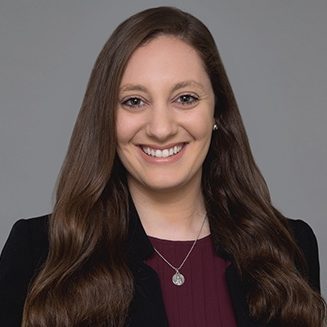 Former Delaware Journal of Corporate Law Editor-in-Chief, Brittany M. Giusini, gives us some insight into her experience during law school and her career today.
Former Delaware Journal of Corporate Law Editor-in-Chief, Brittany M. Giusini, gives us some insight into her experience during law school and her career today.
(1) What was your position on the Journal?
Editor-in-Chief
(3) Where are you currently employed?
Ballard Spahr LLP, Wilmington, Delaware
(3) In what area of law do you practice?
My practice focuses on Delaware corporate litigation and white collar internal investigations.
(4) What career track did you follow?
After law school, I clerked for one year for Justice Holland of the Delaware Supreme Court. Following clerking, I went into private practice in Delaware.
(5) What do you wish you had known about law school while you were a law student?
While I was a student, I wish I would have known the focus of your future practice does not have to be limited. As a student, you may be interested in more than one area of the law. Explore those areas. You do not have to be tied to one practice group.
(6) Aside from excelling academically and joining the Journal, what are some ways that students can stand out to secure job offers?
Students should get out into the community and give back. Not only does this secure valuable connections, it builds confidence and just generally makes you feel good.
(7) What are some lessons you’ve learned during your professional career that will be valuable to current Journal members and recent graduates?
Work hard, but don’t be too hard on yourself! Find the time to help someone who may never be able to repay you! We often measure success by grades or awards – but I have found that real success is actually making a difference in the life of someone else. We, as lawyers (or future lawyers), have the ability to do that.
(8) What are your future career goals?
I want to continue practicing in Delaware and within my current practice group. I also have future aspirations to get more involved in activism relating to certain criminal law issues.
(9) What are some of your other interests?
Politics.
______________________________________________________________

Former Delaware Journal of Corporate Law External Managing Editor, Brandon Harper, gives us some insight into his experience during law school and his career today.
(1) What was your position on the Journal?
External Managing Editor.
(3) Where are you currently employed?
Connolly Gallagher LLP, Wilmington, Delaware
(3) In what area of law do you practice?
Corporate and Commercial Litigation
(4) What career track did you follow?
During law school I focused on gaining as much experience within the Delaware Bar as possible. I spent every semester, from the Fall of my 2L year until I graduated, externing for judges. By taking on these additional responsibilities outside of the classroom, I demonstrated my work ethic to the Delaware Bench and proved that I was capable of thinking and writing like a lawyer. Upon graduation I clerked on the Superior Court, which further cemented these traits. When taking the next step and interviewing with law firms, those qualities shone through on my resume.
(5) What do you wish you had known about law school while you were a law student?
It helps to not let yourself get discouraged by the speed bumps. Failure is just part of the process and can be valuable if you learn from it and improve. Adversity shapes character. Stay focused on your final goal and don’t let disappointments along the way derail your progress. Continue to work hard and the results will come. There will be a time after you have achieved your goals when you will look back on those failures. They won’t seem as significant as they once did.
(6) Aside from excelling academically and joining the Journal, what are some ways that students can stand out to secure job offers?
Say yes to everything. Avail yourself of as many opportunities as become available to you. Delaware Law School students are in a unique position as they attend the only law school in Delaware. Judges in the Delaware courts will often hire Delaware Law students as judicial interns/externs. Establishing yourself within the Bar as early as you can will set you apart from the pack come the full-time hiring period. Delaware is a small state and the Bar is smaller still. As a result, your reputation can change instantly. The earlier that you can establish yourself as a capable, driven, and civil member of the Delaware Bar, the better.
(7) What are some lessons you’ve learned during your professional career that will be valuable to current Journal members and recent graduates?
The word “draft” is a legal fiction. Seek perfection at every stage of the process and take the extra time to do things the right way. Ultimately, your work is a representation of you. If you hand a partner sloppy work product, then you risk being known as a sloppy lawyer.
(8) What are your future career goals?
To continue to deliver quality work product in order to obtain a desired outcome for my clients.
(9) What are some of your other interests?
I enjoy spending time with family at the Delaware Beaches and on Maryland’s Eastern Shore. I enjoy golfing. But what I like to do most is to spend as much time as I’m able with my wife, Chrissy, and our Yellow Labrador Retriever puppy, Dixon.
______________________________________________________________
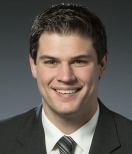 Former DJCL Copy Editor, Phillip Giordano, answers some questions about his service to the Journal and what he’s up to now:
Former DJCL Copy Editor, Phillip Giordano, answers some questions about his service to the Journal and what he’s up to now:
1) What was your position on the Journal?
Copy Editor.
2) From what institution did you receive your undergraduate degree and what area did you study? I went to the University of Delaware and I studied History.
3) Where do you currently work? Gordon, Fournaris & Mammarella, P.A.
4) What area of law do you practice? Commercial and fiduciary litigation.
5) What do you wish you had known about law school while you were a law student? How important it is to work on your writing and public speaking skills.
6) Aside from excelling academically and joining the Journal, what are some ways that students can stand out from the crowd to secure job offers? Network as much as possible. By way of example, students should volunteer at organizations where they can meet attorneys and spend time meeting with alumni. Also, students should generally be well read and up to speed on current events. When not discussing your class rank or interests in the law, future employers will want to know that you are an engaged citizen and that you have an interest in other things besides the law.
7) What are some lessons you’ve learned during your professional career that will be valuable to the Journal’s young alumni? In litigation, at least, your writing matters most. It should be shorter than you think, well organized, and finely tuned, which means that you need to be a brutal editor of your own work. No one has ever read a brief that they thought was too short. A close second to writing is being organized. Checklists are the best way to ensure that you don’t make errors. Checklists are also important in keeping track of your billing, which is more of a hassle than you would think.
8) What experience have you been up to since graduating from Widener Law? Courtroom experience. I didn’t participate in Moot Court, but I have since made up for it by trying as many cases as necessary.
9) What are your future plans? To always look for improvement in my work.
10) Any other interests you’d like to tell us about? Reading non-fiction, cooking, and staying physically active (which currently means playing rugby).
Know Phillip? Connect with him here. For more information about Phillip’s practice, read here.
______________________________________________________________
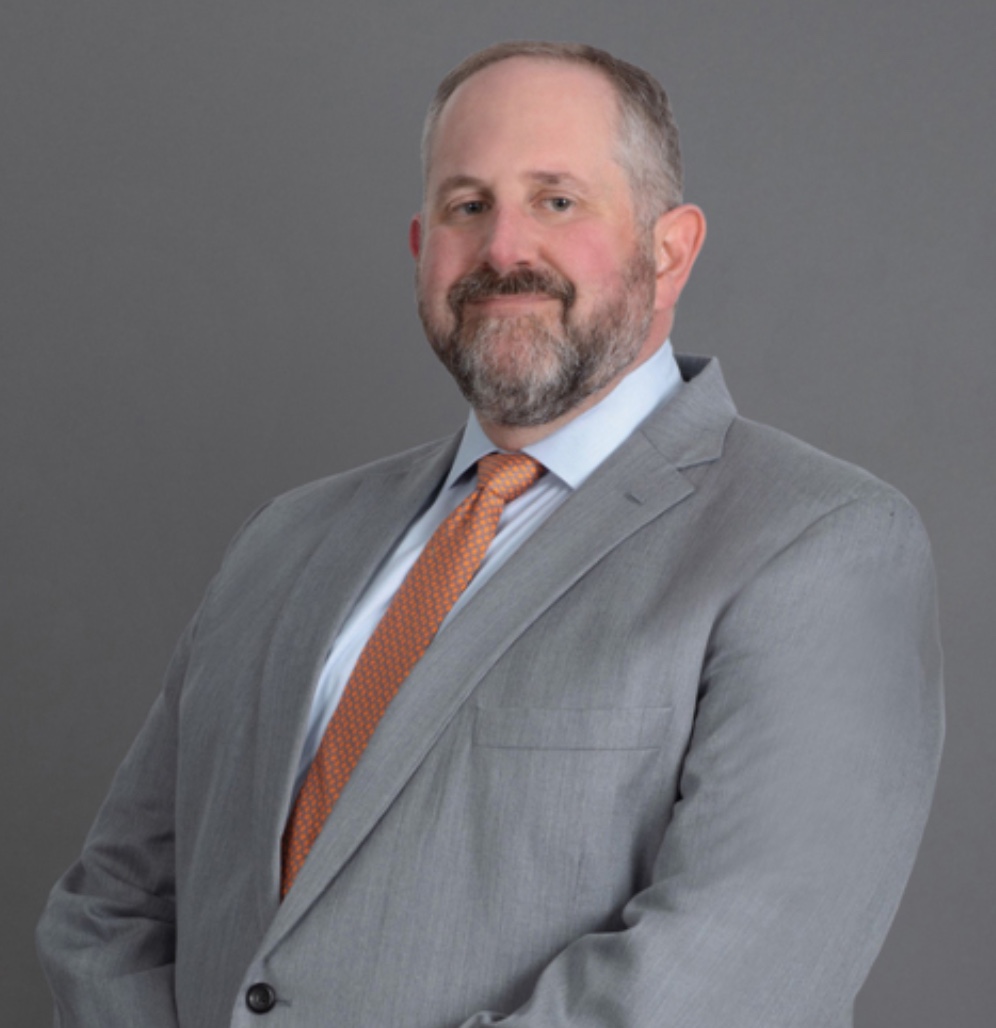 Former DJCL Articles Editor, Gregory Werkheiser, answers some questions about his service to the Journal and what he’s up to now:
Former DJCL Articles Editor, Gregory Werkheiser, answers some questions about his service to the Journal and what he’s up to now:
(1) What was your position on the Journal?
Articles Editor
(2) Where did you earn your undergraduate degree and what was your area of study?
Penn State, University Park Campus. I studied Finance.
(3) Where are you currently employed?
I’m a Partner with Morris, Nichols, Arsht & Tunnell LLP in Wilmington, DE.
(4)What area of law do you practice?
Almost exclusively Business Bankruptcy and Restructuring for going on about 20 years.
(5) What do you wish you had known about law school while you were a law student?
I wish I had understood then what a luxury it was to take all the time I needed to research thoroughly and entirely think through a problem. I would have used my time more efficiency.
(6) Aside from excelling academically and joining the Journal, what are some ways that students can stand out to secure job offers?
Delaware Law School and its students have a unique resource available to them because of the law school’s access to some of the finest state and federal jurists in the nation. I would encourage students to take full advantage of any judicial internship/externship programs that are made available to them and, if their personal circumstances allow, to pursue judicial clerkships after graduation. Many of Delaware’s state and federal judges are well-respected throughout the country and a strong reference from one of them could make the difference in one’s post-graduation job search.
(7) What are some lessons you’ve learned during your professional career that will be valuable to current Journal members and recent graduates?
Be self-aware enough to understand what you know and what you don’t know, be self-confident enough to admit when you don’t know the answer, and be motivated enough to commit to find the answer and follow through. One thing I see young attorneys struggle with consistently (and from which I certainly wasn’t immune) is how to strike the right balance between seeming knowledgeable and confident, on the one hand, and getting too far out over one’s skis, on the other. This tension is nothing new, as the following quote is attributed to the 18th century French philosopher Voltaire demonstrates: “Doubt is an uncomfortable condition, but certainty is a ridiculous one.”
(8) What experience have you gained since graduating from Widener University Delaware Law School?
Such an open ended question. It’s hard to pick just one thing. Life happens. For most of the last 20 years, my practice has focused on business bankruptcy and restructuring, which often involves dealing with clients in crisis. Over the last couple of decades, I have become far more adept at making (and helping others make) complex decisions under time pressure with imperfect information. There’s just no way any law school can fully prepare you for that.
(9) What are your future career goals?
For the time being, I want to continue focusing on doing good work for my firm and my clients and contributing to the Delaware legal community. As for the future, I started my legal career as a federal law clerk, and it was one of the most satisfying things I have ever done. If the stars align, at some point in the not too distant future, I would like to explore the possibility of public service.
(10) What are some of your other interests?
First and foremost, my family. My wife Rachel (’99 DLS grad) and I have three great kids (ages 12, 10 and 8) and , between school and other activities, they keep us going most of the time. I enjoy hiking and backpacking. In terms of more sedentary pursuits, I’m a big fan of well-written/performed science fiction books and audiobooks.
Know Gregory? Connect with him here. Want to know more about Gregory’s practice? Click here.
______________________________________________________________
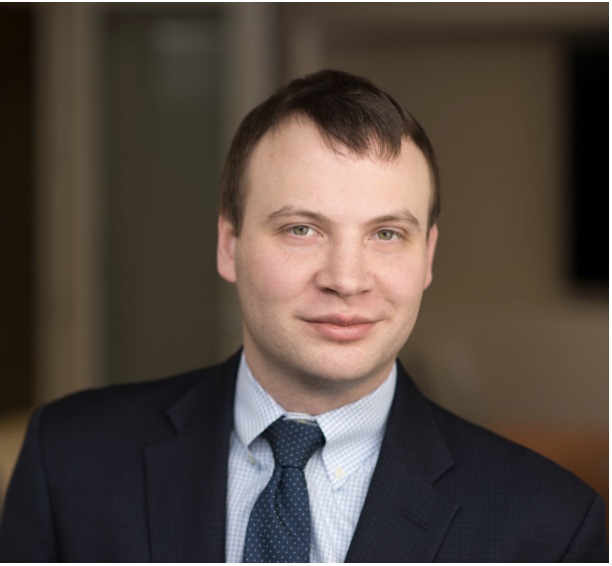 Former DJCL Articles Editor, Andrew Berni answers some questions about his service to the Journal and what he’s up to now:
Former DJCL Articles Editor, Andrew Berni answers some questions about his service to the Journal and what he’s up to now:
1) What was your position on the Journal?
I was an Articles Editor.
2) From what institution did you receive your undergraduate degree and what area did you study? I went to the University of Delaware and I studied Spanish and History.
3) Where do you currently work? I work at Wilson Sonsini in Wilmington.
4) What area of law do you practice? Corporate litigation, primarily in the Court of Chancery
5) What do you wish you had known about law school while you were a law student? It would have been very helpful to have known just how critical it was to do well in the first year (really the first semester).
6) Aside from excelling academically and joining the Journal, what are some ways that students can stand out from the crowd to secure job offers? I think it is helpful to intern for judges and clerk if you have the opportunity.
7) What are some lessons you’ve learned during your professional career that will be valuable to the Journal’s young alumni? I would say you should always have a healthy amount of worry about your future prospects—this applies to looking for a job, passing the bar, etc. This will provide the motivation to put the work in and succeed. Beyond that, I would just say try to do a good job consistently in whatever you are doing, and people will most likely notice.
8) What have you been up to since graduating from Widener Law? I was fortunate enough to work as a law clerk for Justice Seitz of the Delaware Supreme Court before starting at Wilson in September. I have and am learning a lot from both experiences. I think most of all I’ve enjoyed the people I’ve worked with.
9) What are your future plans? I plan to continue to build my skills as an attorney.
10) Any other interests you’d like to tell us about? Outside of professional life, I am most interested in running, cycling, and the continued revitalization of downtown Wilmington.
Know Andrew? Connect with him here. For more information about Andrew’s practice, read here.
______________________________________________________________
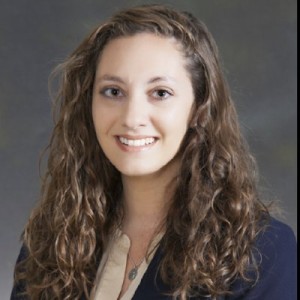
Former DJCL Editor-in-Chief, Brittany Giusini answers some questions about her service to the Journal and what she’s up to now:
1) What was your position on the Journal?
Editor-in-Chief
2) From what institution did you receive your undergraduate degree and what area did you study? I graduated from Temple University and majored in Political Science.
3) Where do you currently work? Greenberg Traurig LLP in Wilmington, Delaware.
4) What area of law do you practice? Corporate Litigation.
5) What do you wish you had known about law school while you were a law student? I would have sought to learn more about the opportunities that provide practical experience such as the Moot Court Honor Society or the Transactional Law Honor Society. While Delaware Law School definitely provides practical experience, it is important to take advantage of those programs.
6) Aside from excelling academically and joining the Journal, what are some ways that students can stand out from the crowd to secure job offers? Students should be involved in networking and charity events. Once they determine which jurisdiction they wish to practice in, students should learn about legal and social events taking place in that state. Attending such events gives students the chance to meet attorneys in the field as well as give back to the community at large. In addition, I find joining LinkedIn is a great way to make connections.
7) What are some lessons you’ve learned during your professional career that will be valuable to the Journal’s young alumni? The most important lesson I have learned is to not lose sight of your goals and dreams. While the legal world can be challenging, remaining dedicated and working hard will help you stand out in your respective firms. Hard work always pays off.
8) What have you been up to since graduating from Widener Law? I am currently working at Greenberg Traurig as a corporate litigation associate. Also, I am planning a wedding to a former Journal member, Peter Tsoflias!
9) What are your future plans? I plan on continuing to work hard as a corporate litigation associate and gain more experience/knowledge about Delaware corporate law.
10) Any other interests you’d like to tell us about? I am interested in assisting any Journal members who would like to gain advice on my personal experience after law school.
Know Brittany? Connect with her here. For more information about Brittany’s practice, read here.
______________________________________________________________
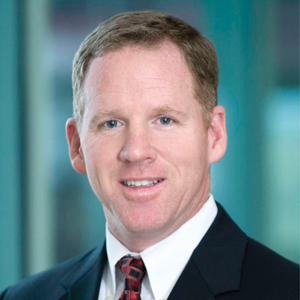 Former DJCL Comment Editor, Kevin R. Shannon answers some questions about his service to the Journal and what he’s up to now:
Former DJCL Comment Editor, Kevin R. Shannon answers some questions about his service to the Journal and what he’s up to now:
1) What was your position on the Journal?
Comment Editor.
2) From what institution did you receive your undergraduate degree and what area did you study? I majored in Accounting at Villanova.
3) Where do you currently work? Potter Anderson & Corroon in Wilmington, Delaware
4) What area of law do you practice? Corporate Litigation
5) Aside from excelling academically and joining the Journal, what are some ways that students can stand out from the crowd to secure job offers? I believe that it is helpful to get work experience prior to (and while in) law school. Although experience working for a law firm or Court is directly relevant, almost any other type of work experience can provide skills that are helpful in the practice of law.
6) What are some lessons you’ve learned during your professional career that will be valuable to the Journal’s young alumni? To succeed requires hard work and always being prepared. In addition, you can learn a great deal watching other lawyers and determining what is (or is not) effective.
7) What have you been up to since graduating from Widener Law? I have been working at Potter Anderson since graduation. I live in Wilmington with my wife and four children.
8) What are your future plans? I plan on continuing to practice law in Wilmington – at least until my children all graduate from college.
Know Kevin? Connect with him here. For more information about Kevin’s practice, read here.
______________________________________________________________
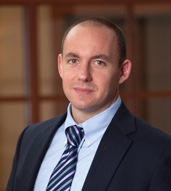 Former DJCL Articles Editor, James S. Green Jr., answers some questions about his service to the Journal and what he’s up to now:
Former DJCL Articles Editor, James S. Green Jr., answers some questions about his service to the Journal and what he’s up to now:
1) What was your position on the Journal? Articles Editor.
2) From what institution did you receive your undergraduate degree and what area did you study? I received a B.A. in Philosophy from Gettysburg College.
3) Where do you currently work? Landis Rath & Cobb LLP
4) What area of law do you practice? I concentrate my practice in the area of commercial bankruptcy litigation. My practice also extends to all areas of business litigation in the Delaware federal and state courts, including IP litigation as Delaware counsel in the Delaware District Court.
5) What do you wish you had known about law school while you were a law student? I wish I realized that early networking is critical to future success. It is important to make and to keep as many professional relationships as possible with classmates and fellow Journal members. In retrospect, I also could have taken better advantage of the school’s specialty programs, particularly moot court. The Institute of Delaware Corporate and Business Law is a great opportunity for anyone looking to practice in that field.
6) Aside from excelling academically and joining the Journal, what are some ways that students can stand out from the crowd to secure job offers? Consider applying for a judicial externship during school or a clerkship after graduation. Also, any experience that can show a potential employer your interest in a specific area in which the firm practices can help. But, the best way to secure an interview is via referral; so, again, network and maintain contacts.
7) What are some lessons you’ve learned during your professional career that will be valuable to the Journal’s young alumni? Confidence and conviction in your competence is important; however, be patient and deferential to more senior attorneys–especially during the first few years after graduation. Under preparation is never okay, and you cannot be over prepared. It is valuable to have a trustworthy mentor, or several mentors, early in your career. Ultimately, you will get out of your career what you put into it.
8) What have you been up to since graduating from Widener Law? I work hard professionally, but I also try to balance my career with my personal life. I enjoy spending free time with my family and traveling with them whenever possible.
9) What are your future plans? Continue to build my practice and spend time with my family.
10) Any other interests you’d like to tell us about? I’m a native Wilmingtonian. I’d like to see and try to contribute to the positive growth of our city, which includes volunteering my time and my support for organizations within the community that I believe share this vision.
Know James? Connect with him here. For more information about James’ practice, read here.
______________________________________________________________
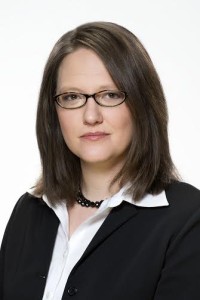 Former DJCL Articles Editor, Melissa N. Donimirski, answers some questions about her service to the Journal and what she’s up to now:
Former DJCL Articles Editor, Melissa N. Donimirski, answers some questions about her service to the Journal and what she’s up to now:
1) What was your position on the Journal? Articles Editor.
2) From what institution did you receive your undergraduate degree and what area did you study? I graduated from Bryn Mawr College and majored in political science.
3) Where do you currently work? I currently work at Proctor Heyman Enerio LLP.
4) What area of law do you practice? Mainly corporate and commercial litigation but I also provide transactional advice in conflict transactions from time to time.
5) What do you wish you had known about law school while you were a law student? Throughout your legal career, the connections you make and maintain are going to be the key to your success. That includes the connections you make with fellow law students.
6) Aside from excelling academically and joining the Journal, what are some ways that students can stand out from the crowd to secure job offers? Publishing articles is great. If your article isn’t selected for publication while you’re on the Journal, write another one.
7) What are some valuable lessons you’ve learned during your professional career that will be valuable to the Journal’s young alumni? Never, ever burn bridges. As I mentioned before, your connections are everything. Over time, it has been interesting watching people evolve in their careers and change jobs. Some have done it well, and others very poorly. Remember: former employers and fellow employees could someday be the ticket to something you want.
8)Any other interests you’d like to tell us about? I have horses and really enjoy riding. It is important to have a hobby that allows you to completely clear your mind.
Know Melissa? Connect with her here. For more information about Melissa’s practice, read here.
______________________________________________________________
 Former DJCL Editor-in-Chief, David B. DiDonato, answers some questions about his service to the Journal and what he’s up to now:
Former DJCL Editor-in-Chief, David B. DiDonato, answers some questions about his service to the Journal and what he’s up to now:
1) What was your position on the Journal? Editor-in-Chief.
2) From what institution did you receive your undergraduate degree and what area did you study? Moravian College; political science and sociology.
3) Where do you currently work? I currently work at Potter, Anderson & Corroon LLP.
4) What area of law do you practice? Corporate Transactional (i.e., corporate governance, M&A, etc.).
5) What do you wish you had known about law school while you were a law student? Law school is intended to teach you how to think like a lawyer. It is much different to be a practicing attorney than a law student. Embrace law school as an opportunity to change the way you think so that you become more inquisitive, analytical, and measured in how you deal with problems. Bright line rules are rare, so learn how to navigate the gray areas.
6) Aside from excelling academically and joining the Journal, what are some ways that students can stand out from the crowd to secure job offers? Nothing will ever exceed good grades and Journal membership. Other extracurricular activities may be helpful to a degree, but you should not overextend yourself to the detriment of your grades. Having an article published can definitely help separate you from the crowd. The interview itself is quite important. You need to show the interviewer that you are truly interested in working at their firm, practicing the law that the firm specializes in, and living in the area that the firm is located. Speaking intelligently about what the firm does and why you want to be an attorney there will take you a long way in your interviews. Unfortunately, for some jobs, our law school puts us at an initial disadvantage. To counter that, you need to go above and beyond the other people interviewing. Preparation can mean the difference between an offer and a rejection.
7) What are some valuable lessons you’ve learned during your professional career that will be valuable to the Journal’s young alumni? It is much easier to become a valuable young associate than you think. No one expects you to start your job and be an expert in your first year (or your second or your third). They expect you to provide value within the spectrum of your abilities. If you are a first year associate (or even a summer associate) who can successfully proofread, use common sense, display basic reading comprehension, and be extremely responsive, you will provide immense value to your firm. You may say, “wow, that sounds easy,” but the truth is that such traits can be a rare commodity sometimes. Use these basic skills to build a foundation of value that you can develop as you learn the intricacies of your practice and overtime you will begin contributing more substantively and evolve into a successful attorney.
Also, the more you learn the less you know, and that is okay. The law is vast and ever-changing. People who think they have it figured out on day one usually are the ones who “don’t get it.” You know you are on the right track when you realize how much more you need to learn and how little you actually know in the grand scheme of things. Becoming a great attorney takes time, patience, commitment, and passion. It is not an easy profession. The hours are long and it requires a lot of sacrifices. What you do, however, has a real impact on people and the world. You are actually helping build something that matters, and that is very motivational.
8) What’ve you been up to since graduating from Delaware Law and what are your future plans? Other than work and stuff that would bore you? Well, my father moved to Kentucky, so I have visited him a few times there. My sister recently had a baby, and I am a first time uncle to an amazing little boy.
9) What are your future plans? Hopefully make partner at my law firm, have a family, live long … you know … the usual stuff.
10)Any other interests you’d like to tell us about? I am a diehard Philadelphia sports fan, which means I have been very depressed for the majority of my life (especially lately). I am also working on acquiring more hobbies, as I think people are getting tired of hearing me talk about Game of Thrones and the Walking Dead.
Know David? Connect with him here. For more information about David’s practice, read here.
______________________________________________________________
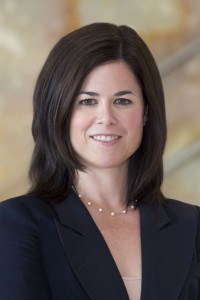 Former DJCL Articles Editor, Meghan A. Adams, answers some questions about her service to the Journal and what she’s up to now:
Former DJCL Articles Editor, Meghan A. Adams, answers some questions about her service to the Journal and what she’s up to now:
1) What was your position on the Journal? I was a staff member from 2005-2006, and then served as Article’s Editor from 2006-2007.
2) From what institution did you receive your undergraduate degree and what area did you study? I received my Bachelors of Science in Business Administration fry of North Carolina at Chapel Hill.
3) Where do you currently work? I currently work at Morris James, LLP in Wilmington, DE.
4) What area of law do you practice? My practice concentrates in the areas of corporate and commercial litigation. The cases that I handle involve anything from a breach of fiduciary duty matter in the Court of Chancery to fraud and breach of contract action in the Complex Commercial Litigation Division of the Superior Court of Delaware. I also handle similar cases in the District of Delaware.
5) What do you wish you had known about law school while you were a law student? Practicing law is about so much more than just knowing the relevant cases. While knowing the law both in your jurisdiction and practice areas is very important, it is also about using good judgment and having a thoughtful strategy and plan for your case. This takes a lot of time and hard work, and it is a continuous learning exercise.
Another important thing to remember, particularly if you plan to practice in the tri-state area, is that the people that you go to law school with are going to be your colleagues for the next thirty years. The relationships that you develop now can carry forward for a long time to come. Develop good relationships now, as you never know when you might need to call a former classmate for a referral or advice – or they may do the same.
6) Aside from excelling academically and joining the Journal, what are some ways that students can stand out from the crowd to secure job offers? One of the most rewarding and beneficial opportunities I had in law school was to be an extern to Chief Justice Myron T. Steele. Chief Justice Steele was and is a great mentor to me, and the lessons that I learned from him have stayed with me today. I would encourage every student to either obtain an externship with a judge or to get involved in one of the clinics to get hands-on experience.
I also think it is important to practice your interview skills. Sometimes one interview with a firm is your only opportunity to meet with the firm. Having a bad interview can really hurt your chances at a second interview or potential offer. Practice with friends, go to the Career Development Office or talk to a trusted professor.
7) What are some valuable lessons you’ve learned during your professional career that will be valuable to the Journal’s young alumni? Get involved and don’t be afraid to “put yourself out there.” I participated in the District of Delaware’s Federal Trial Practice Seminar this past spring, and it proved to be a very valuable experience for me. By participating in this program, I was able to get to know all of the Federal judges, and also learn from experienced trial practitioners across the country. We also had the opportunity to argue a Motion in Limine in front of Magistrate Judge Burke and participate in a full day jury trial, where actual jurors sat and decided our case. One of the best pieces of advice I received during this program was to remember that while you may be less experienced than your adversary, you can always be the most prepared.
Learn from and observe the more senior attorneys around you. What kind of attorney do you want to be? There are many different styles and you can learn what to do (or what not to do) in your own practice.
Help out your fellow attorneys. We are all very busy, but if your fellow associate needs help to get something finished to meet a deadline, try to step in and help. You never know when you might need someone and people are more willing to help when they know they can also count on you to do the same for them.
Remember that you are your own brand. Do what you can to market yourself and get involved with groups relevant to your practice area both locally and nationally. I am involved in the Richard S. Rodney Inn of Court and am also the Vice Chair of the Partnerships and Alternative Business Entities Subcommittee of the American Bar Association, Business Law Section. Participation in these groups has helped me gain invaluable contacts both in and out of Delaware.
Surround yourself with supportive family and friends. I am very fortunate to have a family that supports and encourages me and friends (both lawyers and non-lawyers) that understand the nature of a litigation practice.
Try to find an outlet that can help you relieve stress. Being an attorney is a stressful job with long hours. I believe that having another hobby or outlet to relieve your stress can help you focus more when it comes to your job.
8) What’ve you been up to since graduating from Delaware Law and what are your future plans? I have expanded my practice area and continue to develop clients and contacts. I started my career practicing in a very narrow area of corporate law and my practice has now evolved into practicing in many different areas of corporate and commercial litigation on both the plaintiff and defense side.
Moreover, as I stated above, I am very involved in the Richard S. Rodney Inn of Court along with the American Bar Association and plan to continue my involvement in these and other organizations.
9) Any other interests you’d like to tell us about? I am an avid golfer who played in college. I still play today, although not as much as I would like! However, I still enjoy competitive golf and try to play competitive rounds when I can.
Know Meghan? Connect with her here. For more information about Meghan’s practice, read here.
______________________________________________________________
Former DJCL Articles Editor, Vincent C. Thomas, answers some questions about his service to the Journal and what he’s up to now:
1) What was your position on the Journal? I served on the Staff in 2004 and as an Articles Editor in 2005.
2) From what institution did you receive your undergraduate degree and what area did you study? I earned a B.S. in Accounting from the University of Delaware.
3) Where do you currently work? I am currently a partner with Young Conaway Stargatt & Taylor LLP in Wilmington, Delaware.
4) What area of law do you practice? I practice in the areas of business planning and tax. In particular, I represent both large/mid-size businesses and individuals with complex business and tax matters, including, mergers, acquisitions, entity formations, business succession and tax and estate planning.
5) What do you wish you had known about law school while you were a law student? Law schools should provide more practical classes about counseling clients. A lawyer is often asked for advice or counsel on things well beyond the bounds of the law. When you develop relationships with your clients, you become their trusted adviser and they will begin to rely upon your sound judgment on their significant decisions whether or not related to the law.
6) Aside from excelling academically and joining the Journal, what are some ways that students can stand out from the crowd to secure job offers? While in law school, students should find mentors in the community where they desire to practice. A good mentor is invaluable. My mentors provided me with professional guidance, recommendation letters, and other assistance with my transition from law school to the working world. To this day, I still call on the same mentors for guidance regarding significant professional decisions. Second, law students should pursue judicial clerkships. My clerkship with Chief Justice Myron Steele of the Delaware Supreme Court was one of the most rewarding experiences in my life. Chief Justice Steele prepared me for the practice of law and much of my success can be traced back to him.
7) What are some valuable lessons you’ve learned during your professional career that will be valuable to the Journal’s young alumni? Do the things your parents taught you when you were five years old and everything will work out: (i) keep your head down and work hard; (ii) be kind and respectful to others; and (iii) in the words of Thoreau, “be yourself- not your idea of what you think somebody else’s idea of yourself should be.”
Working hard requires commitment and a drive to succeed. In addition to providing a good work product, many of the most valued and respected attorneys generate their own business. While associates are not necessarily expected to originate clients, those that do stand out from the pack. Generating business is hard work and results in long hours due to marketing lunches, speaking engagements, dinners, social events, etc. Every hour spent on non-billable marketing requires an additional hour of billable time in the office. However, as we all learned at a young age, results will follow if you work harder than the other guy.
Be kind and respectful to everyone. I mean everyone, not just your superiors. I’ve never understood why some lawyers feel privileged to disrespect their staff, but can assure you such attitude will only harm your reputation and success in the long run. Life is far more enjoyable in a respectful and kind environment.
Along the way, you will receive information about ways to succeed in your legal practice. No tip or suggestion, however, will be of any help if it is inconsistent with “you.” If you stay true to yourself, you will find success. Put simply, you will find success if work harder than everyone else, remain humble and kind in the process, and never stray from yourself or your core values.
8) What’ve you been up to since graduating from Delaware Law? I spend time with my family in my free time. I am fortunate to have a supportive wife and two wonderful children. Great lawyers work long, long hours. It is important, however, to strike the proper balance between work and home. It is not always easy, but striking the proper balance will make you a better lawyer.
9) What are your future plans? Continue providing for my wife and children and enjoying the moments I get to spend with them. From a professional standpoint, continue to work hard, learn and develop my practice. I cherish the relationships I have developed with my clients over the last ten years and look forward to future growth with my clients.
10) Any other interests you’d like to tell us about? I try to stay in good physical shape with daily exercise notwithstanding long working days and a young family. I think exercise and a proper diet makes me a sharper, more focused, and less stressed lawyer.
Know Vince? Connect with him here. For more information about Vince’s practice, read here.
______________________________________________________________
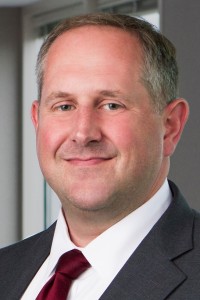 Former DJCL Articles Editor, Gregory W. Werkheiser, answers some questions about his service to the Journal and what he’s up to now:
Former DJCL Articles Editor, Gregory W. Werkheiser, answers some questions about his service to the Journal and what he’s up to now:
1) What was your position on the Journal? I had the privilege of serving as an Articles Editor.
2) From what institution did you receive your undergraduate degree and what area did you study? I earned a B.S. in Finance from the Pennsylvania State University, University Park Campus.
3) Where do you currently work? I am a partner with Morris, Nichols, Arsht & Tunnell LLP, here in Wilmington, Delaware, where I have practiced law since 1997.
4) What area of law do you practice? I practice business bankruptcy and restructuring law. Delaware – and specifically Morris Nichols – has been a wonderful place to practice in this legal field. I’ve had a chance to play a part in some of the largest and most cutting edge bankruptcy cases in the nation.
5) What do you wish you had known about law school while you were a law student? I have always struggled with rote memorization. During law school, I agonized over my inability to remember such things as case titles and the names of the various estates in land. What I only realized in hindsight is that memorizing the material is far less important to what we do for a living than understanding the concepts attached to those terms and being able to express and apply those concepts in a coherent and lucid way. If I could go back to the 1993 me, I would tell him to pour more energy to understanding the analytical logic of the cases and statutes, and into further honing his writing skills. Critical thinking and writing tools, once acquired, stay with you forever. All that information jammed into your brain through rote memorization will likely be swept away the next time you need those neurons for something else.
6) Aside from excelling academically and joining the Journal, what are some ways that students can stand out from the crowd to secure job offers? Two things come to mind. First, focus on activities that develop and demonstrate critical thinking and sound judgment. The presence of leadership positions on your resume – and by leadership positions, I mean those that really require you to take on real responsibility, such as many of the leadership positions for the DJCL – give prospective employers some level of comfort that they can trust you with important projects and clients. It is far more important to have a few, very meaningful activities on your resume than to load it up with lots of entries about clubs and activities that do not demonstrate what skills you really bring to the table. Second, if your finances allow for it, pursue the opportunity for a judicial clerkship after you graduate from law school. And, if you secure that clerkship, make the most of it. You have an invaluable opportunity to learn from someone (i.e., your judge), who most likely has a lifetime of insight and experience to impart.
7) What are some valuable lessons you’ve learned during your professional career that will be valuable to the Journal’s young alumni? The importance of establishing a reputation early in your career as someone who will keep one’s head in a crisis and who can be trusted to stand by their word.
Most lawyers have to be problem solvers for their clients. That is especially true in my practice, which focuses on restructuring distressed businesses. That’s not the same as pretending for your clients to have all of the answers. Things tend to move fast in the restructuring world and we constantly have to advise clients on decisions that need to be made with incomplete information. Part of the “art” of being a good counselor is helping clients to deal with uncertainty in a way that gives them the guidance and confidence necessary to make optimal decisions under less than ideal circumstances.
Especially for those lawyers who plan to practice regularly in one jurisdiction, I can’t overemphasize the importance of establishing your reputation as someone whose word can be trusted. In Delaware, for example, we have six sitting bankruptcy judges who are all located in the same building. I can count on the fact that I will appear in front of each of them multiple times over the course of a year. Were I to play fast and loose with the Court and others in the bankruptcy bar, I can assure you that word would soon get around that people needed need to be wary of me. And, once that label attaches, it is a difficult one to dislodge.
8) What’ve you been up to since graduating from Widener Law? I clerked for Judge Jane R. Roth on the Third Circuit during my first year out of law school. It was an experience I wouldn’t trade for anything. Since then, I have been in private practice with my current firm. In 1999, I had the good fortune to meet – and three years later marry – Rachel Lowy, another Widener Law School and DJCL alum. We have three wonderful children together. We have been living in the Landenberg, PA area for the last 11 years, but are in the process of relocating back to Wilmington.
9) What are your future plans? In truth, I just want to continue working at being the best father, husband and lawyer I can be. If I focus on those things, I expect much of the rest will take care of itself.
10) Any other interests you’d like to tell us about? As in what do I do in my spare time? Our kids are still pretty young and actually seem to enjoy my company. I know that may change someday soon – the teenage years are just around the corner for our oldest. But, for the time being, I’m grateful to do as much with them as I can.
Know Greg? Connect with him here. For more information about Greg’s practice, read here.
______________________________________________________________
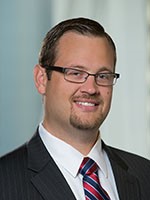 Former DJCL Articles Editor, Matthew D. Beebe, answers some questions about his service to the Journal and what he’s up to now:
Former DJCL Articles Editor, Matthew D. Beebe, answers some questions about his service to the Journal and what he’s up to now:
1) What was your position on the Journal? Articles Editor, 2012-2013.
2) From what institution did you receive your undergraduate degree and what area did you study? University of Delaware, Biology with Chemistry minor.
3) Where do you currently work? Skadden, Arps, Slate, Meagher & Flom LLP (Wilmington, DE).
4) What area of law do you practice? Corporate Restructuring.
5) What do you wish you had known about law school while you were a law student? The importance of real world legal experience. Gaining experience early while you are still in law school helps build your resume for obtaining summer and post-graduation employment, while also letting you hone your legal writing and research skills. It also will help you figure out what area of the law interests you and provide you with invaluable contacts in your preferred area of practice.
6) Aside from excelling academically and joining the Journal, what are some ways that students can stand out from the crowd to secure job offers? Students should engage in activities (socially and academically) that demonstrate their interest in their preferred area of law. I also would not discount the importance of the interview process, not just professionally but also on a social level. Of course, the main goal of the interview is to sell your qualifications, but also try to relax and engage your interviewer(s) conversationally to show that you would be enjoyable to work with. The interviewer already knows what is on your resume; let him or her get to know other aspects of what you bring to the table and let them see how you would be as a colleague.
7) What are some valuable lessons you’ve learned during your professional career that will be valuable to the Journal’s young alumni? Learn every aspect of your case or assignment. If you are the most knowledgeable person on the facts and circumstances surrounding your case it will make you much more valuable to those you are working for and may open doors to other opportunities.
8) What’ve you been up to since graduating from Widener Law? I have been working in the corporate restructuring practice of my firm and also have worked on multiple pro bono matters. My wife and I also welcomed our son, Andrew, into the world last February in what was one of the snowiest winters I can remember (lots of shoveling to make sure we could get the car out if needed). He continues to keep us pretty busy.
9) What are your future plans? My plan is to continue to develop myself as an attorney and strive to always be helping people, both personally and professionally.
10) Any other interests you’d like to tell us about? I love spending time with my family at the beach (as opposed to the “shore”) as much as possible. We’re also big fans of UD football.
Know Matthew? Connect with him here.For more information about Matthew’s practice, read here.
______________________________________________________________
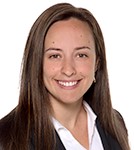 Former DJCL Senior Staff Editor, Selena E. Molina, answers some questions about her service to the Journal and what she’s up to now:
Former DJCL Senior Staff Editor, Selena E. Molina, answers some questions about her service to the Journal and what she’s up to now:
1) What was your position on the Journal? Senior Staff.
2) From what institution did you receive your undergraduate degree and what area did you study? Widener University, Sociology.
3) Where do you currently work? Richards, Layton & Finger, P.A.
4) What area of law do you practice? Commercial Litigation.
5) What do you wish you had known about law school while you were a law student? During law school, professors often stressed the importance of networking and making connections. I did not want to use social or family connections to enhance my career and was steadfast that I wanted to “earn” whatever position I received. I wish I had known that networking during law school is crucial. And, despite my initial impressions, “networking” did not mean “using people for jobs;” it meant putting yourself out there, meeting the Delaware bar, and making strong connections who can help guide you in this profession. I am now proud to say that I am the attorney I am today because of the talented people I have met along the way.
6) Aside from excelling academically and joining the Journal, what are some ways that students can stand out from the crowd to secure job offers? The most important lesson I learned is that it is not enough to concentrate solely on your academics. A student who just goes through the motions, studying hard and performing well in their classes, may get their foot in the door at their “dream job” but, without the knowledge that comes from actively engaging in the legal community, they may be passed on for more active and connected candidates. For example, if you want to practice in Delaware, joining an Inn of Court or attending Delaware State Bar Association (“DSBA”) events can make you more visible as a candidate for future employment. Once your stellar grades have opened the door to potential positions, your involvement in the local bar association or Inn of Court can set you apart from the sea of candidates all proclaiming to be interested in the particular locale or practice area. Build up meaningful and demonstrable connections to your chosen jurisdiction or practice and use those to better your career prospects.
7) What are some valuable lessons you’ve learned during your professional career that will be valuable to the Journal’s young alumni? A good attitude can make all the difference. Partners and supervisors are only human after all. They want to work with someone who is pleasant and enjoyable to be around. Every firm or legal department will be filled with a wide range of personalities; you might mesh with some and clash with others. Always remain positive. Always be willing to assist and never believe that a job is too small or “beneath” you. Every assignment is important; every email, every letter, every filing. Approach every assignment with your upmost focus and attention and always produce quality work. These qualities will ensure you become an integral part of the team and, over time, will make you indispensable: a necessity for upwards movement.
8) What’ve you been up to since graduating from Widener Law? After I graduated from Widener Law, I served as a law clerk for The Honorable William C. Carpenter, Jr. on the Delaware Superior Court. While working for Judge Carpenter, I passed the Delaware, New Jersey, and Pennsylvania bar exams. Midway through my judicial clerkship I was offered a position as an Associate at Richards, Layton & Finger where I currently practice. Since beginning in September 2014, I have worked on matters ranging from pro bono representation of a child in foster care to an expedited business dispute in the Court of Chancery. I am also involved in the Rodney Inn of Court, the American Bar Association, and the Delaware Bar Association. As an active member of the American Bar Association’s Young Lawyers Division, I currently serve as an Associate Judge on the Awards and Subgrants Team.
9) What are your future plans? I plan to work hard and continue to learn day after day. I hope to prove myself worthy for advancements at my current firm and, perhaps, live out my childhood dream of becoming a judge.
10) Any other interests you’d like to tell us about? A small plug for one of my activities: I will be participating in the DSBA’s musical this year: The Crucible. We have an amazing cast and the proceeds benefit the Combined Campaign for Justice. It is sure to be a cannot-miss show!
Know Selena? Connect with her here. For more information about Selena’s practice, read here.
______________________________________________________________
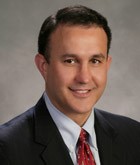 Former DJCL Internal Managing Editor, Francis G.X. Pileggi, answers some questions about his service to the Journal and what he’s up to now:
Former DJCL Internal Managing Editor, Francis G.X. Pileggi, answers some questions about his service to the Journal and what he’s up to now:
1) What was your position on the Journal? Internal Managing Editor.
2) From what institution did you receive your undergraduate degree and what area did you study? I received an English degree from St. Joseph’s University.
3) Where do you currently work? I currently am the Managing Partner of the Delaware office of Eckert Seamans Cherin & Mellot, LLC.
4) What do you wish you had known about law school while you were a law student? While I was a law student, I think it would have been helpful if I had known that the results of final exams were more important in terms of future employers than what I actually learned during class or whether I attended class.
5) Aside from excelling academically and joining the Journal, what are some ways that students can stand out from the crowd to secure job offers? I think that students today have an option not available in the past to “stand out from the crowd” by using social media strategically. For example, I am aware of stories about some students who found a niche in a particular area based on which they started a blog. I realize that it is difficult for a law student to become an expert in an area of the law, but there may be a creative way that one or more students could start a blog on some area of interest to the legal profession in a professional manner that would allow them to obtain some name recognition.
6) What are some valuable lessons you’ve learned during your professional career that will be valuable to the Journal’s young alumni? One of the lessons I have learned that may be valuable to alumni is that the ability to attract and retain clients is an essential component for most lawyers in most firms who intend to be successful. New associates are not expected to do so, but it is a long process that one should start as early as possible.
7) What’ve you been up to since graduating from Widener Law? Since graduating from Widener, I have been practicing law.
8) What are your future plans? My future plans are to continue to practice law.
9) What are some books you would recommend? I would recommend the last two books that Justice Scalia co-authored that dealt with writing briefs and effective oral arguments, as well as the interpretation of statutes and contracts.
10) Any other interests you’d like to tell us about? I try to spend as much time with my family as possible when I am not working, and I try to exercise and play racquetball as often as I can to keep in shape. That may sound rather uneventful, but there is something to be said for stability and predictability in one’s schedule.
Know Francis? Connect with him here. For more information about Francis’s practice, read here.
______________________________________________________________
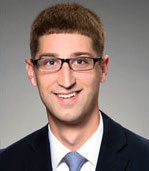
Former DJCL Articles Editor, Benjamin P. Chapple, answers some questions about his service to the Journal and what he’s up to now:
1) What was your position on the Journal? Articles Editor.
2) From what institution did you receive your undergraduate degree and what area did you study? Towson University, Sociology and Criminal Justice.
3) Where do you currently work? Friedlander & Gorris, P.A.
4) What do you wish you had known about law school while you were a law student? While I certainly appreciated throughout law school that it was important to get legal experience outside of the classroom, it was not until after graduating that I realized gaining legal experience outside of the classroom is, most cases, essential. Outside legal experience will help you realize your true interests and will provide you with contacts/connections that will, hopefully, help you secure your first full-time legal position.
5) Aside from excelling academically and joining the Journal, what are some ways that students can stand out from the crowd to secure job offers? I think what separates a lot of people in life is focus, or lack thereof. I’ve spoken at length to many people who have exceptional credentials, i.e., top of the class, law review, etc., but they lack focus; they lack a plan. Goals are important, but it’s executing those goals, and having a plan to do so, that sets people apart. Excelling academically and joining prestigious organizations like the Journal will likely open doors and present great opportunities, but without a plan of action you risk failing to capitalize.
6) What are some valuable lessons you’ve learned during your professional career that will be valuable to the Journal’s young alumni? I recently attended a CLE at Penn Law where a presenter, who began his career as an attorney but has spent the majority of his career as an investment manager, shared the following insights that I find to be more than worthy of repeat (in no particular order of importance): (1) know yourself, not who you wish you were. Some of us are fortunate enough to be good at many things, but very few of us are truly great at multiple things. Figure out what you’re great at, and focus your energy accordingly; (2) there is a certain number of major career decisions that one should make; according to the speaker, it is likely more than 2 but no more than 4. On the one hand, making big decisions too frequently can indicate lack of commitment/focus, but on the other hand, failing to capitalize on opportunities when they present themselves can close doors that may never re-open; (3) align yourself with others who share your values and ideals, both in your personal and professional lives; and (4) keep your head down (e.g., avoid drama), do your work well, be pleasant, and the rest will fall into place.
On an entirely separate note, in my opinion many young legal professionals have very little financial literacy. I would be remiss if I did not encourage the young readers to learn more about financial planning, which is especially important considering the sizable student loans and significant income potential associated with the legal profession. For example, there are considerable tax planning opportunities for recent and soon-to-be law school graduates, but many young professionals are too pre-occupied to begin planning their financial future. Of course, the sooner you have a plan the better. See Rule of 72.
7) What’ve you been up to since graduating from Widener Law? I passed the Delaware Bar and became licensed to practice law in the state; I served as a Judicial Law Clerk for the Superior Court of Delaware from August 2013 until June 2014, after which I began working at Friedlander & Gorris as a business litigation associate; and most importantly, I recently got engaged and am getting married in September 2015.
8) What are your future plans? I plan to continue working hard to become a better person and great attorney, while maintaining a good work-life balance.
9) What are some books you would recommend? I recommend reading anything by Bryan Garner.
10) Any other interests you’d like to tell us about? Outside of the law, I am very interested in financial planning and real estate investing.
Know Ben? Connect with him here. For more information about Ben’s practice, read here.
______________________________________________________________
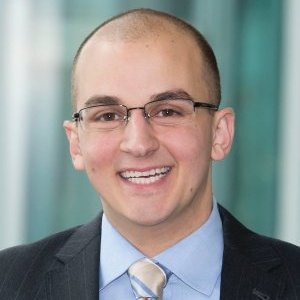 Former DJCL Internal Managing Editor, Peter I. Tsoflias, answers some questions about his service to the Journal and what he’s up to now:
Former DJCL Internal Managing Editor, Peter I. Tsoflias, answers some questions about his service to the Journal and what he’s up to now:
1) What was your position on the Journal? Internal Managing Editor.
2) From what institution did you receive your undergraduate degree and what area did you study? West Chester University of Pennsylvania. Finance and Accounting.
3) Where do you currently work? Dickstein Shapiro LLP (Washington, D.C.)
4) What do you wish you had known about law school while you were a law student? I wish I had more practical knowledge of the various legal practice areas. In my opinion, this type of information helps you make the best decisions concerning your career path, and gives you more context when working on classroom assignments.
5) Aside from excelling academically and joining the Journal, what are some ways that students can stand out from the crowd to secure job offers? Take advantage of every opportunity to gain practical legal skills, and begin growing your network as early in your career as possible. Join organizations such as the Transactional Law Honor Society, Moe Levine, and Moot Court. To build your network, reach out to alumni of Widener and the various organizations of which you are a member (such as the Journal). Try to schedule a lunch or a coffee meeting with one of these individuals at least once a month. Ask them about their practices; most of the decisions I made thus far in my career were influenced by the advice I received at these lunches.
6) What are some valuable lessons you’ve learned during your professional career that will be valuable to the Journal’s young alumni? In accepting the Oscar® for Best Actor, Matthew McConaughey gave an incredible speech, the lessons of which should prove invaluable to anyone throughout their life endeavors. He said that he needs three things each day—something to look up to, something to look forward to, and someone to chase. To whatever or whomever you look up to, McConaughey reminds us that “it is a scientific fact that gratitude reciprocates.” I always found that showing gratitude, even for the smallest act of kindness, is the easiest way to make a positive impact on the world. As for something to look forward to, think about who in your life inspires you to be a better person. For me, I look forward to making my family and my girlfriend proud. Each of them have made me who I am today, and I wake up each morning eager to pay it forward. The person McConaughey chases is his future self; each day, he endeavors to be a better version of himself. This mindset will help you view every event—positive or negative—as an opportunity to grow.
7) What have you been up to since graduating from Widener Law? Continuing to grow as a lawyer, and build my network.
8) What are your future plans? Ultimately, my goal is to be a great lawyer and an even better person. Along the way, I look forward to helping as many people as I can.
9) What are some books you would recommend? Lone Survivor, American Sniper, and anything written by Malcolm Gladwell.
10) Any other interests you’d like to tell us about? Spending time with my family and friends, and watching professional sports (namely, the Pittsburgh Steelers).
Know Pete? Connect with him here. For more information about Pete’s practice, readhere.
______________________________________________________________
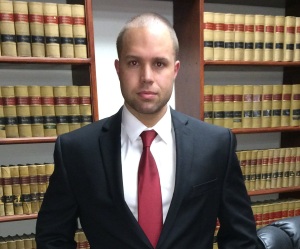 Former DJCL Internal Managing Editor, Andrew P. Castano, answers some questions about his service to the Journal and what he’s up to now:
Former DJCL Internal Managing Editor, Andrew P. Castano, answers some questions about his service to the Journal and what he’s up to now:
What was your position on the Journal? Internal Managing Editor.
From what institution did you receive your undergraduate degree and whatarea did you study? Albright College. Political Science.
Where do you currently work? The Law Offices of Thaniel J. Beinert & Associates in Brooklyn, NY.
What do you wish you had known about law school while you were a law student? I would have wanted to have the chance to be assigned more practical assignments. I felt like that would have prepared me better once I started at my firm.
Aside from excelling academically and joining the Journal, what are some ways that students can stand out from the crowd to secure job offers? Be personable and just be yourself. When you have to speak to clients, most of them want to speak to a person, not a robot. The same applies when you are in an interview trying to land a job offer.
What are some valuable lessons you’ve learned during your professional career that will be valuable to the Journal’s young alumni? Network literally as much as possible. I marched in the Columbus Day Parade in Manhattan a few months ago and the gentleman I was next to happened to be the founder of two foundations. We talked for about two hours that day and two weeks later he called me and asked me to be Legal Counsel for both foundations.
What’ve you been up to since graduating from Widener Law? I have been working closely with the Firefighters and EMS Foundation and the International Columbia Association. I have also begun the process of forming my own brain aneurysm awareness foundation to help aid in the research and treatment of aneurysm patients. Besides that, I have been trying to travel as much as possible and also have been trying out new restaurants throughout New York City.
What are your future plans? To be completely honest, a lot of people will say become partner at a firm or make a lot of money, and that is all great, but for me, every day I set a goal to be a better person and attorney than I was the day before. If I could do that, even just a little bit each day, my future will take care of itself.
What are some books you would recommend? How Good Do You Want to Be?: A Champion’s Tips on How to Lead and Succeed in Work and in Life by Nick Saban.
Any other interests you’d like to tell us about? New York City sports, cooking, and traveling.
Know Andrew? Connect with him here. For more information about Andrew’s practice, readhere.
______________________________________________________________
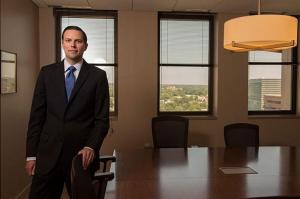 Former DJCL Editor-In-Chief, Thomas A. Uebler, answers some questions about his service to the Journal and what he’s up to now:
Former DJCL Editor-In-Chief, Thomas A. Uebler, answers some questions about his service to the Journal and what he’s up to now:
What was your position on the Journal? Editor-In-Chief.
From what institution did you receive your undergraduate degree and whatarea did you study? Arizona State University, BS, Justice Studies.
Where do you currently work? Cooch and Taylor.
What do you wish you had known about law school while you were a law student? I would have tried to have more fun. Life doesn’t get easier after law school. I would have applied for state and federal court clerkships. It is great training and will open doors throughout your career. I would have tried to learn more about the business of law. Schools don’t teach that.
Aside from excelling academically and joining the Journal, what are some ways that students can stand out from the crowd to secure job offers? A polished and well-organized resume, and the ability to talk about yourself confidently and comfortably in an interview. This takes practice. Post-graduation clerkship in a court that is relevant to the job sought. Judicial externship or Wolcott Fellowship during law school. Moot court or mock trial experience. Research assistant or other relevant work experience. Published articles.
What are some valuable lessons you’ve learned during your professional career that will be valuable to the Journal’s young alumni? Find mentors. Lots of them. Treat everyone with courtesy and respect, even opposing counsel who are jerks. Make family and friends a priority, no matter how busy you think you are. Good lawyers need three things: skills, reputation, and clients. Work hard on all three. Work with people who share your interests and values.
What’ve you been up to since graduating from Widener Law? I got married and started a family.
What are your future plans? Trying to balance work and life, and continuing to develop my skills, reputation, and clients.
What are some books you would recommend? All of Bryan Garner’s books. Getting to Yes, and other books by Fisher and Ury. The Choice, by Og Mandino.
Any other interests you’d like to tell us about? Golf, Arizona State football, and Flyers hockey.
Know Tom? Connect with him here. For more information about Tom’s practice, readhere.
______________________________________________________________
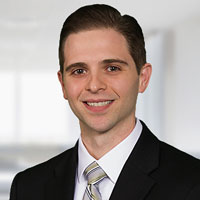 Former DJCL External Managing Editor, Joel D. Corriero, answers some questions about his service to the Journal and what he’s up to now:
Former DJCL External Managing Editor, Joel D. Corriero, answers some questions about his service to the Journal and what he’s up to now:
What was your position on the Journal? External Managing Editor, 2008-2009.
From what institution did you receiveyour undergraduate degree and what area did you study? Rutgers University, New Brunswick. I majored in Criminal Justice with minors in Psychology and Criminology.
Where do you currently work? Stradley Ronon Stevens & Young, LLP in Philadelphia.
What’ve you been up to since graduating from Widener Law? Working and traveling with my family – I have one child and another on the way.
What are your future plans? Stay at Stradley and hopefully make partner.
What are some books you would recommend? Any book by Mario Puzo.
Any other interests you’d like to tell us about? Travel, wine and sports.
Know Joel? Connect with him here. For more information about Joel’s practice, readhere.
______________________________________________________________
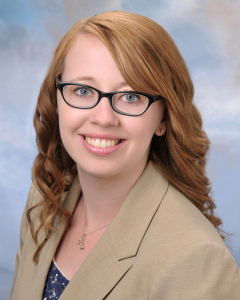 Former DJCL Styles Editor, Ryann Buckman, answers some questions about her service to the Journal and what she’s up to now:
Former DJCL Styles Editor, Ryann Buckman, answers some questions about her service to the Journal and what she’s up to now:
What was your position on the Journal? Styles Editor, Volume 36.
From what institution did you receive your undergraduate degree and what area did you study? I went to the University of Alaska, Fairbanks, where I majored in Criminal Justice with a minor in Sociology.
Where do you currently work? I work for the Augulis Law Firm in Warren, New Jersey, where I specialize in Estate Planning (trusts and wills), Estate and Trust administration, and Elder Law.
What’ve you been up to since graduating from Widener Law? On a personal level, I moved to North Jersey and purchased a house. My boyfriend, fellow Widener alumnus, Joseph Siclari and I have spent of our free time remodeling the fixer-upper.
What are your future plans? With respect to my legal career, I am very happy at the firm I am at and plan to continue to expand our ever-growing elder law practice.
What are some books you would recommend? The Things They Carried by Tim O’Brien.
Any other interests you’d like to tell us about? I love riding motorcycles in my free time.
Know Ryann? Connect with her here. For more information about Ryann’s practice, read here.
______________________________________________________________
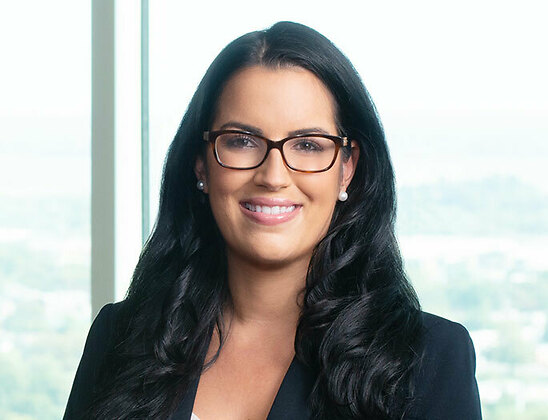
Former Delaware Journal of Corporate Law External Managing Editor, Sabrina Hendershot, gives us some insight into her experience during law school and her career today.
(1) What was your position on the Journal?
External Managing Editor 2015-2016.
(2) Where did you earn your undergraduate degree and what was your area of study?
Texas A&M University—Corpus Christi, B.A. Political Science.
(3) Where are you currently employed?
Morris, Nichols, Arsht & Tunnell, LLP, Wilmington, Delaware
(4) In what area of law do you practice?
Corporate & Business Litigation.
(5) What do you wish you had known about law school while you were a law student?
As Muhammad Ali said, “What you’re thinking is what you’re becoming.” It’s easy to slip into self-doubt in a competitive environment like law school. But I’ve learned that the practice of law is a meritocracy. If you keep working hard and visualizing your success, you absolutely will achieve it. Although your path to success may be non-linear, if you continue to work hard to achieve your goals despite the obstacles in front of you and truly believe in yourself, you will make it. It will take time—but don’t settle. The only person who can get in your way is you.
(6) Aside from excelling academically and joining the Journal, what are some ways that students can stand out to secure job offers?
Judicial internships and clerkships are incredible opportunities for a variety of reasons. During law school I interned for then-Master now Judge LeGrow in the Delaware Court of Chancery, and served as a Josiah Oliver Wolcott Fellow to Justice Collins J. Seitz Jr. in the Delaware Supreme Court. After law school, I was fortunate enough to serve as Justice Seitz’s full-time law clerk. I cannot overstate the value of these opportunities. Every case I worked on was unique, and presented a new learning opportunity. I also learned how seriously our judicial officers take their positions. Both Justice Seitz and Judge LeGrow were fantastic mentors who taught me to think critically and challenged me to dig deep into the issues in the pursuit of justice. Not only was I able to take part in the administration of justice, I also formed close relationships with the judge/justice, their administrative staff, and my fellow clerks and interns which I truly value. It is an honor to clerk and I highly recommend students consider it.
(7) What are some lessons you’ve learned during your professional career that will be valuable to current Journal members and recent graduates?
To be a lawyer generally, and a junior associate specifically, is to be a life-long learner. You will often have assignments that you find interesting, and others you will find not so interesting. Regardless of how you feel about the assignment, use it as an opportunity to learn. For example, when it was time to write my note for the DJCL, I knew nothing about my topic—I just knew the case I wrote about interested me. So, I reached out to the attorneys on the case and they were kind enough to share their thoughts with me. Speaking with them helped me narrow in on the issue I wanted to write about, and was also an excellent networking opportunity. It also made writing the article much more enjoyable.
Similarly, what you put into an assignment is what you will get out of it. If you spend the time outlining for your classes early, you will retain information on a deeper level and will have less work to do come exam day (and bar exam day). Likewise, if you spend the time carefully reviewing the discovery in your case and closely reviewing applicable case law, you can help the partners make smart decisions about how to proceed. Partners are busy and they rely on junior associates to take a deep dive into the facts of the case. I’ve had cases where at face value it looked like we would lose on an issue. But after digging deep into the case law, I found a doctrine that applied to our case that nobody had considered. By putting in the time and energy to thoroughly research the facts and law, I was able to help our client survive a motion to dismiss. Put in the time, and don’t assume the law is static on an issue. If you treat your clients’ situations like they are your own and exhaust all options before accepting a loss, you will add significant value.
(8) What experience have you gained since graduating from Widener University Delaware Law School?
After graduation, I was privileged to clerk for Justice Seitz for a year. I have been working in the corporate and business litigation department of Morris Nichols since September 2017.
(9) What are your future career goals?
I plan to continue working hard and learning as much as I can. I’m grateful to have fantastic mentors here at Morris Nichols, so with their help I hope to continue building my career and reputation within the Delaware bar.
(10) What are some of your other interests outside of the law?
I’d like to take this opportunity to shamelessly plug the Delaware SPCA and Delaware Humane Society. I adopted my best friend Waffles the cat (who is my favorite interest outside of the law) from the Delaware SPCA. She is the sweetest, goofiest, most well-behaved little lady, and I am so happy to have found her! If you’re looking to purchase a new friend, please look into adopting. All pets come spayed/neutered, up to date on vaccinations, and microchipped. And if they’re anything like Waffles, they will love you fur-ever.

